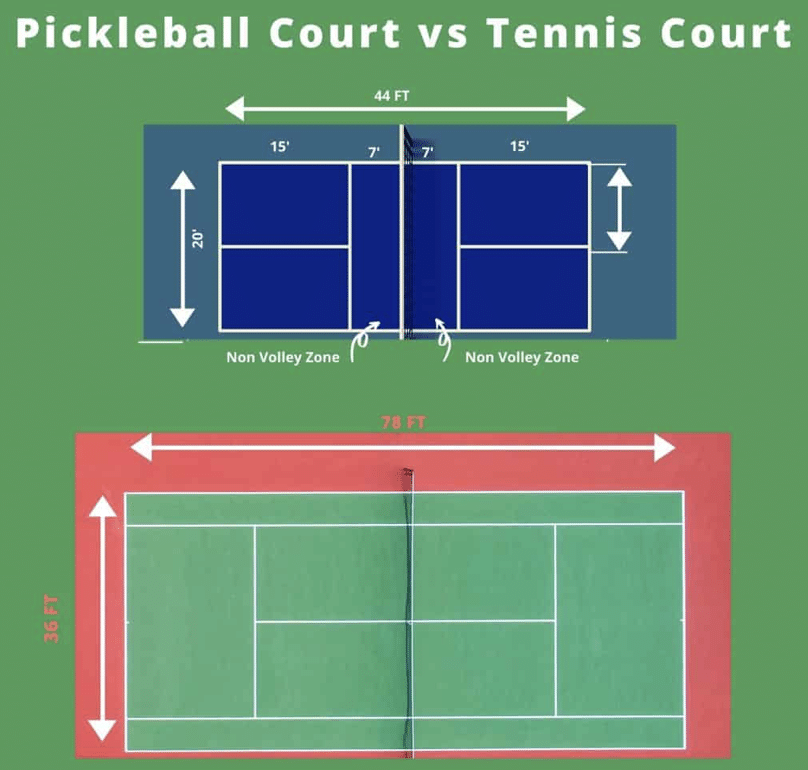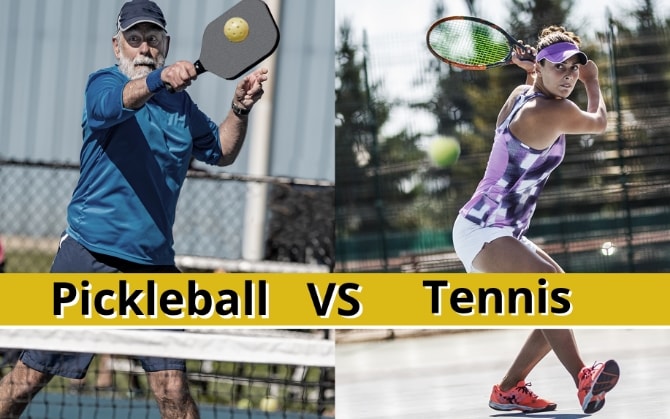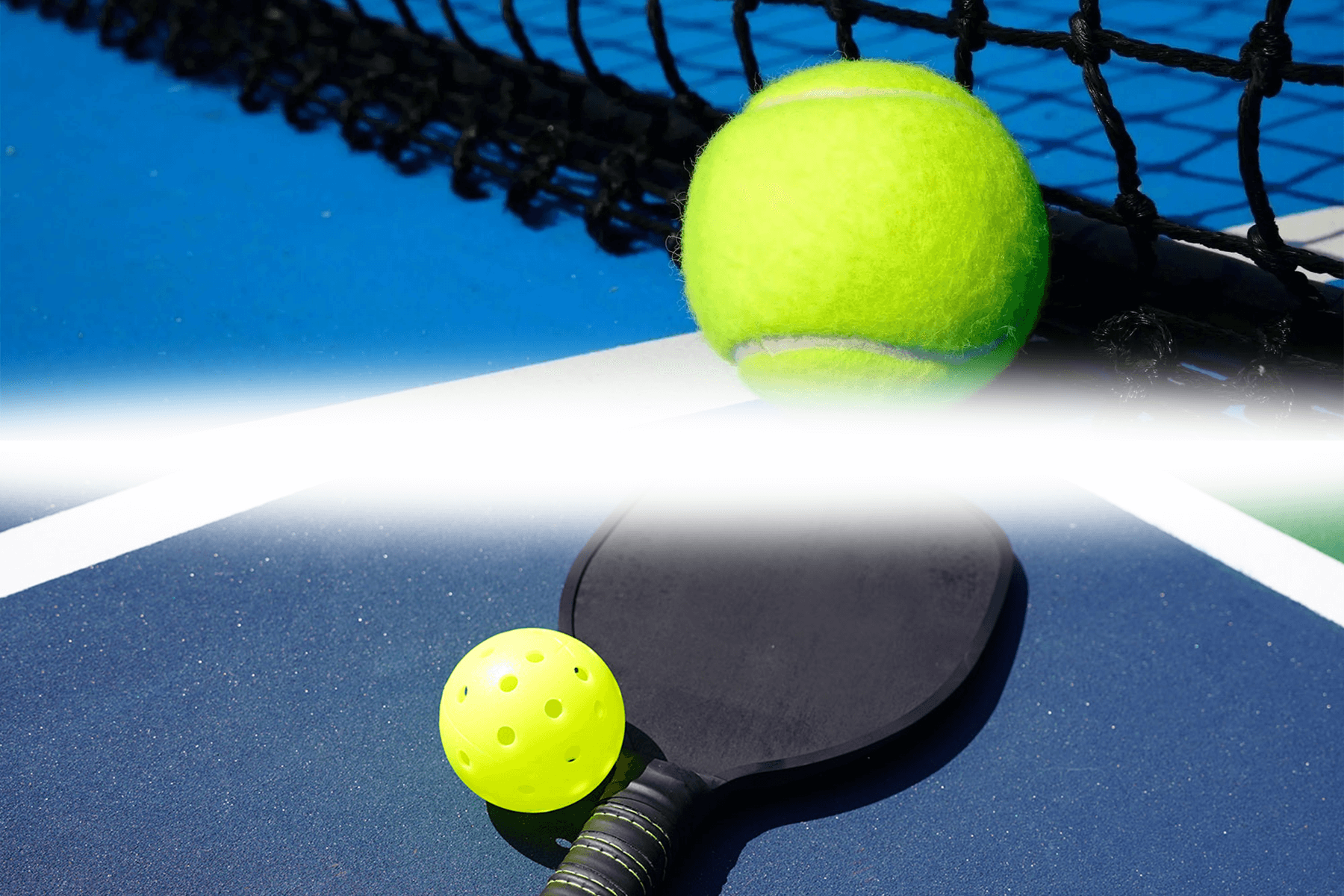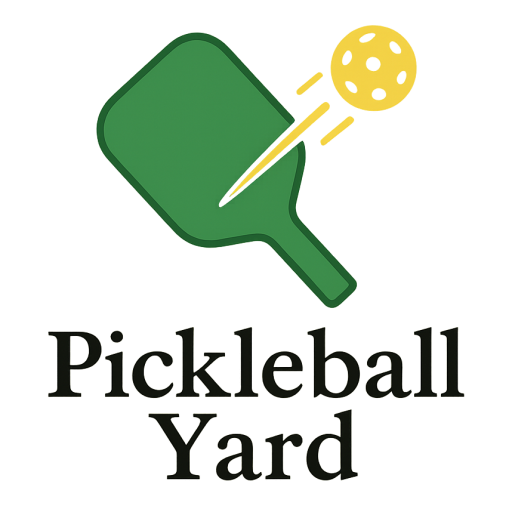For most beginners, pickleball feels easier than tennis because it’s simpler, slower, and gentler.
If you’re weighing court time, I’ve coached both sports and played them for years. This guide breaks down is pickleball easier than tennis with clear facts, real examples, and simple steps. By the end, you’ll know which game fits your goals, your body, and your budget.

Why pickleball often feels easier on day one
Pickleball has fewer moving parts. The court is smaller, the paddles are shorter, and the plastic ball travels slower. The serve is underhand. Players can rally right away with short swings and light footwork.
Tennis asks more from your body at first. The court is longer and wider. The ball is faster and bounces harder. The overhead serve and topspin strokes take time to learn.
I see new players rally within 10 minutes in most beginner pickleball clinics. That same group might need a few sessions to rally in tennis. So, is pickleball easier than tennis for pure beginners? In most cases, yes.

Key differences that shape the learning curve
Here are the basics that make the early path feel different.
- Court size: Pickleball is 20 by 44 feet. Tennis is 27 by 78 for singles and 36 by 78 for doubles. Shorter runs help new players last longer in a game.
- Net height: Both sit around 34 inches at the center. This keeps shots honest but fair.
- Serve: Pickleball uses an underhand serve. Tennis uses an overhead serve that needs more skill and shoulder strength.
- Ball speed: A perforated plastic pickleball slows fast in the air. A felt tennis ball stays heavy and jumps off the court.
- Paddle vs racquet: Pickleball paddles are solid and smaller. Tennis racquets have strings and offer more spin and power, but also a steeper curve.
- The kitchen: Pickleball has a non-volley zone that limits smash power at the net. That rule gives rallies a friendlier pace.
- Scoring: Standard pickleball uses side-out scoring to 11, win by 2. Some leagues use rally scoring. Tennis uses games, sets, and tiebreaks. Many find pickleball scoring easier after one session.
When people ask, is pickleball easier than tennis, I point to these parts. Each one cuts the barrier to entry for new players.

Skill-by-skill comparison
Use this side-by-side view to see where you might progress faster.
- Serve: Pickleball’s underhand motion is simple and low risk. Tennis serves can take months to feel smooth and safe.
- Return: Both sports reward depth on returns. In pickleball, a steady chip return works fast. In tennis, the ball’s weight demands better timing.
- Groundstrokes: Short, compact swings shine in pickleball. Tennis needs bigger swings and more footwork to handle pace and spin.
- Volleys: Quick hands are key in both. The kitchen in pickleball keeps volleys under control. Tennis net play can be more explosive and punishing.
- Spin: Pickleball spin is growing but modest. Tennis spin is core to control and defense. That adds complexity.
- Footwork: Pickleball rewards small steps and balance. Tennis asks for longer sprints and fast recoveries.
If your goal is to rally soon and have fun fast, is pickleball easier than tennis? It will feel that way for most new and casual players.

Fitness demands and impact on the body
Pickleball is kind to joints for many adults and seniors. Short runs and lighter swings lower stress on knees and lower backs. Heart rates rise, but in a steady, friendly way.
Tennis can be harder on the body. Long sprints, quick stops, and heavy rotation raise strain on ankles, knees, hips, and shoulders. Singles is the toughest. Doubles is gentler.
Typical intensity ranges show a clear gap. Tennis singles often lands in a higher effort zone than casual pickleball. Yet competitive pickleball can get very fast. Is pickleball easier than tennis at full speed? In top play, not always. But for daily fitness, pickleball is often more forgiving.

Strategy depth: simple to start, deep over time
Pickleball starts simple. Keep the ball in play. Aim deep on the return. Get to the kitchen and dink with control. The early rules guide you into smart habits fast.
Tennis has layers from day one. You must handle spin, pace, serves, and court geometry. That depth is a joy but can slow comfort for new players.
Over time, both sports get deep and rich. Dinking battles in pickleball feel like chess. Tennis rallies can feel like a tug of war with speed and angles. Is pickleball easier than tennis once you chase high-level strategy? It depends on your style, patience, and touch.

Cost, gear, and access
Gear and court access also change how easy a sport feels.
- Gear cost: Good beginner pickleball paddles start around 50 to 100 dollars. Solid tennis racquets often cost 100 to 300 dollars.
- Balls: Pickleballs are inexpensive and last well for casual play. Tennis balls lose bounce faster and need frequent refresh.
- Shoes: Court shoes help both sports. One pair can do both if it has a non-marking sole.
- Courts: Many parks now paint pickleball lines over small areas or repurpose tennis courts. Demand is high, so plan ahead.
Lower cost and simple gear make entry smooth. Is pickleball easier than tennis for your wallet and schedule? Often, yes.

Who finds each sport easier?
People come in with different skills. That affects the answer.
- Total beginners: Most pick up pickleball faster. The first rally comes sooner.
- Kids: Pickleball can feel fun and quick. Tennis builds great long-term skills and fitness.
- Seniors: Pickleball is kinder to joints and great for social play.
- Former baseball or volleyball players: Tennis serve or overheads may feel more natural. Still, many switch smoothly to pickleball.
- Cardio seekers: Tennis singles is a bigger engine test. Competitive pickleball can also push you hard.
So, is pickleball easier than tennis for every group? Not always, but it leans that way for many.

A practical learning plan for your first month
Here is a simple path I use with new students.
- Week 1: Learn grip, ready stance, and safe footwork. In pickleball, add the kitchen rule and soft dinks. In tennis, learn the split step and contact point.
- Week 2: Serve and return. In pickleball, practice a simple underhand serve and deep return. In tennis, work on a smooth toss and easy body turn.
- Week 3: Net play. In pickleball, practice third shot drops and blocks. In tennis, add short volleys and approach shots.
- Week 4: Game sense. Keep score, call lines, and set goals. Track unforced errors and try to cut them by half.
Follow this plan and ask again: is pickleball easier than tennis for your timeline? Your own results will tell you.

Common mistakes to avoid when switching
I see these errors a lot. Small tweaks fix them fast.
- Tennis to pickleball: Stop swinging so big. Shorten your backswing. Keep the paddle out front.
- Pickleball to tennis: Move your feet more. Build a higher contact for topspin and depth.
- Both ways: Warm up longer than you think. Practice soft hands first. Then add speed.
These habits can shape whether is pickleball easier than tennis for you, or the other way around.
Safety and injury notes
Every sport has risk. Good prep lowers it.
- Warm up: Five minutes of light jog or fast walk. Add dynamic moves for hips, calves, and shoulders.
- Strength: Twice a week, add simple squats, calf raises, rows, and band work for shoulders.
- Recovery: Hydrate, stretch calves and hips, and use a soft tissue tool for quads and glutes.
Data show that falls, ankle sprains, Achilles strains, and shoulder issues are common in both sports. Pickleball has many older players, so slips and trips can spike. Tennis sees elbow pain and knee strain from heavy loads. Use good shoes, mind the surface, and build up slow. Is pickleball easier than tennis on your body? With smart habits, both can be safe and fun.
Real-world examples from the court
From my clinics, I see patterns.
- A 62-year-old runner started pickleball and rallied in 15 minutes. He joined doubles within a week and played three times a week pain-free.
- A 28-year-old soccer player tried tennis first. The serve stalled progress. He moved to pickleball, gained feel, then came back to tennis with better touch.
- A family of four started with pickleball. They learned scoring fast, laughed a lot, and stayed with it. Later, they used those hand skills to enjoy beginner tennis.
Stories like these explain why many say is pickleball easier than tennis. The wins come early, and that keeps people playing.
How to choose based on your goals
Match the sport to your top aim.
- Quick fun and social play: Pickleball.
- Big cardio and long rallies in singles: Tennis.
- Gentle on joints with fast success: Pickleball.
- Love long-term skill growth and spin: Tennis.
- Want both: Play both. Each boosts the other.
Ask yourself one last time: is pickleball easier than tennis for what you want this year? Then pick the lane and start.
Frequently Asked Questions of is pickleball easier than tennis
Is pickleball easier than tennis for absolute beginners?
Yes, most beginners rally faster in pickleball. The court is smaller, the serve is underhand, and the ball is slower.
Does pickleball require less fitness than tennis?
Often, yes, especially for casual play. Tennis singles usually demands more speed, endurance, and recovery.
Which sport has a simpler scoring system?
Pickleball scoring feels simpler after one session, even with side-out rules. Tennis scoring takes longer to memorize and track.
Can pickleball skills help my tennis game?
They can. Soft hands, quick reactions, and net comfort from pickleball carry over well to doubles tennis.
Is pickleball safer for seniors?
It can be, due to shorter runs and lighter swings. Still, slips and Achilles issues can happen, so warm up and wear good shoes.
Will a tennis player find pickleball boring?
Not at all at higher levels. Fast hands, dinks, and speed-ups make it sharp and exciting.
Which is cheaper to start?
Pickleball gear is often cheaper. Courts are also easy to find in many parks.
Conclusion
So, is pickleball easier than tennis? For most new and returning players, yes. The smaller court, slower ball, and underhand serve create fast wins and low stress. Tennis still shines for big fitness goals, deep spin skills, and long rallies.
Pick the sport that fits your body and your time right now. Try both for a month, track how you feel, and follow the joy. Ready to dive deeper? Subscribe for weekly drills, gear guides, and simple practice plans that get you playing more and hurting less.
